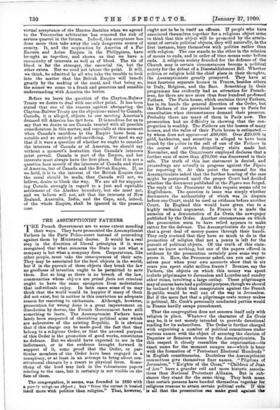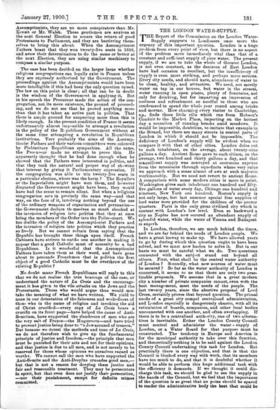THE ASSUMPTIONIST FATHERS.
ri•HE French Government are to some extent mending their ways. They have prosecuted the Assumptionist Fathers in the Paris Police-court instead of proceeding against them by Ministerial decree. It would be a real step in the direction of liberal principles if it were recognised that what concerns the State is not what a company is but what a company does. Corporations, like other people, must take the consequences of their acts. They may be associated for the best objects in the world, but if in the pursuit of these objects they break the law no goodness of intention ought to be permitted to save them. But so long as there is no breach of the law, communities whose objects are prima facie not criminal ought to have the same exemption from molestation that individuals enjoy. In both cases some of us may think that the world would be happier if many of them did not exist, but in neither is this conviction an adequate reason for resorting to euthanasia. Although, however, prosecution for wrong done is a great improvement on dissolution by decree, the French Government have still something to learn. The Assumptionist Fathers have lately been suspected of cherishing political aims which are subversive of the existing Republic. It is obvious that if this charge can be made good the fact that they belong to a religious Order, or that the avowed purpose of this Order is the promotion of good works, constitutes no defence. But we should have expected to see in the indictment, or in the evidence brought forward in support of it, some proof that the Order, or par- ticular members of the Order have been engaged in a conspiracy, or at least in an attempt to bring about con- stitutional changes by a resort to physical force. Some- thing of the kind may lurk in the voluminous papers relating to the case, but it certainly is not visible on the face of them.
The congregation, it seems, was founded in 1850 with a purely religious object ; but "from the outset it busied itself more with politics than religion." That, however, ought not to be in itself an offence. If people who have associated themselves together for a religious object come to think that this object will be promoted by the attain. ment of certain political objects, they will naturally, in the first instance, busy themselves with politics rather than with religion. The one stands to the other in the relation of means to ends, and in order of time means come before ends. A religious society founded for the defence of the Church may in certain circumstances become a political society for the defeat of a Disestablishment Bill. Whether politics or religion held the chief place in their thoughts, the Assumptionists greatly prospered. They have at least fourteen separate houses in France, besides others in Italy, Belgium, and the East. Something in their programme has evidently had an attraction for French- men, for there are now more than four hundred professed Fathers. The Paris house, which contains thirty Fathers, has in its hands the general direction of the Order, but the Fathers of the provincial houses come to Paris for consultation when circumstances demand their presence. Probably there are many of them in Paris now. The prosecution had no difficulty in showing that the con- gregation is wealthy. The Fathers are the lessees of many houses, and the value of their Paris house is estimated— by whom does not appear—at £60,000. Over L20,000 in gold, banknotes, and securities is alleged to have been found by the police in the cell of one of the Fathers in the course of certain domiciliary visits made last November, and the Commissary employed declares that a further sum of more than £70,000 was discovered in their safe. The truth of this last statement is denied, and proceedings are actually in progress against the Figaro for reporting it. At this point the counsel for the Assumptionists asked that the further hearing of the case might be postponed until the proper Court had decided whether the document published in the Figaro was forged. The reply of the Procureur to this request seems odd to Englishmen. The question in issue was simply whether documents the authenticity of which was in dispute before one Court, could be used as evidence before another Court. In England this would have given rise to a highly technical argument. In France it is made the occasion of a denunciation of La Croix, the newspaper published by the Order. Another circumstance on which the prosecution seem to have relied appears to make rather for the defence. The Assumptionists do not deny that a great deal of money passes through their hands. They only contend that they have so much to do in the promotion of religion that not a penny is left for the pursuit of political objects. Of the truth of this state- ment we know nothing, but one of the papers offered in evidence by the prosecution certainly goes some way to prove it. How, the Procureur asked, can you call your- selves poor when your own accounts show that in six years you spent eight million francs ? Because, say the Fathers, the objects on which this money was spent include pilgrimages to Jerusalem and Lourdes and sundry other items, involving a large outlay. These pilgrimages may of course have had apolitical purpose, though we should be inclined to think that conspirators against the French Republic would be well out of the way in Jerusalem. But if the mere fact that a pilgrimage costs money makes it political, Mr. Cook's personally conducted parties would in France hardly escape punishment.
That the congregation does not concern itself only with religion is plain. Whatever the character of La Croix may be, it is not merely intended to provide devotional reading for its subscribers. The Order is further charged with organising a number of political committees under various names with the object of securing the election of Deputies or Senators chosen by the Assumptionists. In this respect it closely resembles the organisation—its exact name for the moment escapes us—which is busy with the formation of " Protestant Electoral Hundreds " in English constituencies. Doubtless the Assumptionist committees give themselves finer names. "Pilgrims of Jerusalem," "Knights of the Cross," "Children of Joan of Arc" have a grander roll and more historic associa- tions than National Protestant Alliance. But in sub- stance they stand for the same thing. They both mean that certain persons have banded themselves together for religious reasons to attain certain political ends. If this is all that the prosecution oan make good against the Assumptionists, they are no more conspirators than Mr. Yensit or Mr. Walsh. These gentlemen are anxious at the next General Election to secure the return of good Protestants to Parliament, and they are bestirring them- selves to bring this about. When the Assumptionist Fathers boast that they won twenty-five seats in 1898, and avow their determination to do the same or better at the next Election, they are using similar machinery to compass a similar purpose.
The case has been decided on the larger issue whether religions congregations can legally exist in France unless they are expressly authorised by the Government. The proceedings against the Assumptionists would have been more intelligible if this bad been the only question raised. The law on this point is clear; all that can be in doubt is the wisdom of the Government in applying it. But in his speech the Procureur made the action of the con- gregation, not its mere existence, the ground of proceed- ing, and we do not see that he proved anything more than that it has taken an active part in politics. That there is ample ground for suspecting more than this is likely enough. In the present condition of France it seems unfortunately almost impossible to attempt a revolution in the policy of the R-publican Government without at the same time attempting a revolution in Republican institutions. Very probably the aims of the Assump- tionist Fathers and their various committees were coloured by Plebiscitary Republican sympathies. All the same, the Proi•nreur made no attempt to prove this. He apparently thought that he bad done enough when he showed that the Fathers were interested in politics, and that they took the natural and proper way of showine that interest by giving it Parliamentary expression. If the congregation was able to win twenty-five seats in a particular election, where was the harm ? The Royalists or the Imperialists might have won them, and however disgusted the Government might have been, they would have had the sense to remain silent. But when a religious congregation acts in precisely the same way—and that way, on the face of it, involving nothing beyond the use of the ordinary weapons of organisation and persuasion— the Government declare tle mselves so much shocked at the intrusion of religion into politics that they at once bring the members of the Order into the Police-court. We too dislike the policy of the Assumptionist Fathers and the intrusion of religion into politics which they practise so freely. But we cannot refrain from saying that the Republic has brought these things upon itself. French Cabinets have striven to outdo one another in making it appear that a good Catholic must of necessity be a bad Republican. Is it wonderful that the Assumptionist Fathers have taken them at their word, and have gone about to persuade Frenchmen that in politics the first object of a good Catholic must be the overthrow of the existing Republic ?
No doubt many French Republicans will reply to this that we do not realise the true bearings of the case, or understand the nature of La Croix and the encourage- ment it has given to the vile attacks on the Jews and the Protestants. Those who would argue thus would mis- take the meaning of what we have written. We yield to none in our detestation of the falseness and wickedness of those who in the name of religion and invoking the aid of Christ crucified—every copy of La Croix bears a crucifix on its front page--have helped the cause of Anti- Semitism, have supported the slanderers of men who are the very salt of France—the Huguenots—and have tried to prevent justice being done to " aJew accused of treason." But because we detest the methods and tone of La Croix, we do not therefore wish to give up the fundamental principle of justice and freedom,—the principle that men must be punished for their acts and not for their opinions, and that justice is due to all men, and is not merely to be reserved for those whose opinions we ourselves regard as worthy. We cannot call the men who have supported the Anti-Semite and the Anti-Dreyfus crusades good men,— but that is not a reason for denying them justice and fair and reasonable treatment. They may be persecutors in spirit, but that even does not justify their persecution, —nor their punishment, except for definite crimes committed.



















































 Previous page
Previous page